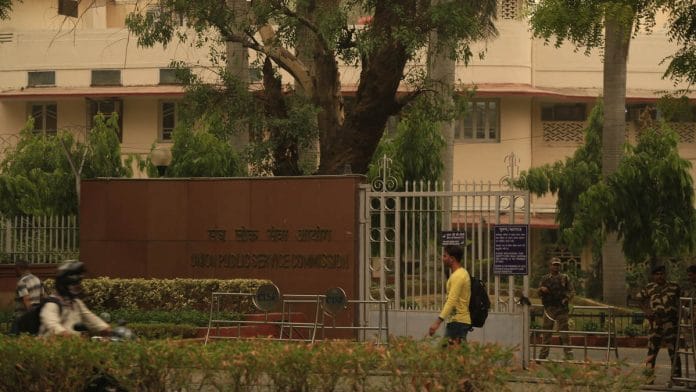New Delhi: The acceptance of the nine private sector individuals recommended by the Union Public Service Commission (UPSC) as lateral entrants to the Government of India is likely to depend on the prerogative of the next administration.
The process of accepting the recommendations has been put on hold for now, pending any missive from the administration, a top government source told ThePrint.
The lateral entry candidates for the Indian bureaucracy were picked nine months after the posts were first advertised by the government.
Once the next government accepts them, the candidates will have to go through additional layers of tests and verifications before their induction, highly-placed sources from the Department of Training and Personnel said.
“The next government that comes to power will review the recommendations. They may choose to accept or reject the recommendations,” a senior government official told ThePrint.
“The appointment process will start after they take a decision on the recommendations,” the official added.
Such appointments in the government are usually not carried out during elections. But the government has reshuffled and empanelled several senior-level bureaucrats over the last few weeks.
One of the nine candidates told ThePrint that they hadn’t been provided any further information about the appointments since the UPSC recommendations came out in April. Saying they were hopeful of hearing from the government soon, the candidate refused to speak further on the issue.
The candidates are believed to be holding off on resigning from their current positions in the absence of a final word from the government.
Also read: Modi govt struggles to fill IAS-IPS vacancies but UPSC recruitment falls by nearly half
Need for fresh talent
Grappling with a severe shortage of IAS officers, the Narendra Modi government, in July last year, invited private sector individuals for appointment as joint secretaries, a post generally held by members of the Indian Administrative Service (IAS). The idea was to inject fresh talent into the government, where departments of critical importance are often handled by officers with no subject expertise.
In the first chapter of the exercise, the government invited applicants for 10 departments, seeking expertise in financial services, revenue, economic affairs, agriculture, cooperation and farmer welfare, road transport and highways, shipping, environment, forest and climate change, new and renewable energy, civil aviation, and commerce.
More ministries will be brought in if the project proves successful.
Over 6,000 candidates applied for the positions. Once the UPSC was appointed as the recruiting body for the process, aspirants were asked to move fresh applications with more details, bringing the number of applicants down to around 3,000.
Interviews were held in the first week of April, and the names of the nine finalists announced by the subsequent week — no candidate was found for the department of revenue.
A UPSC source told ThePrint that the selection process was made difficult by the absence of clarity on the skill sets required.
“For instance, the government had only advertised that it needed candidates for the post of joint secretary in the civil aviation ministry,” the source said.
“So, no one was sure if that meant the candidate should have administrative experience or that they should be an expert in airport management or should have other technical experience,” the source added. “So, selecting the candidates was difficult.
“If the government accepts the UPSC recommendations and decides to induct more professionals in the future, the criteria will need much more refinement,” the source added.
Not sealed yet
Meanwhile, the selected candidates still face a long road ahead before their appointments are sealed.
If the UPSC recommendations are accepted by the next government, they will have to undergo a verification of their character and antecedents (a security clearance procedure) as well as a medical exam. The names will then have to be cleared by the Appointments Committee of the Cabinet, which is headed by the prime minister.
The lateral entry scheme has received considerable resistance from within the bureaucracy, particularly career bureaucrats in the IAS.
A senior official from the IAS who serves in the central government, however, told ThePrint that it wasn’t lateral entry per se that they had a problem with.
“The government could have always hired private sector talent on contracts as and when required,” the official said.
“There was also no harm in also creating a separate joint secretary post for them. The problem is with institutionalising the process,” the official added.
Also read: UPSC recruitment has fallen 40% since 2014 while govt struggles to fill IAS-IPS vacancies







Civil servants are opposing this move.
Read this
https://www.thehindu.com/opinion/open-page/the-philosophy-of-power-and-prestige/article24300594.ece
The next government should take a call on this. Quite a few fellow travellers have been short listed.